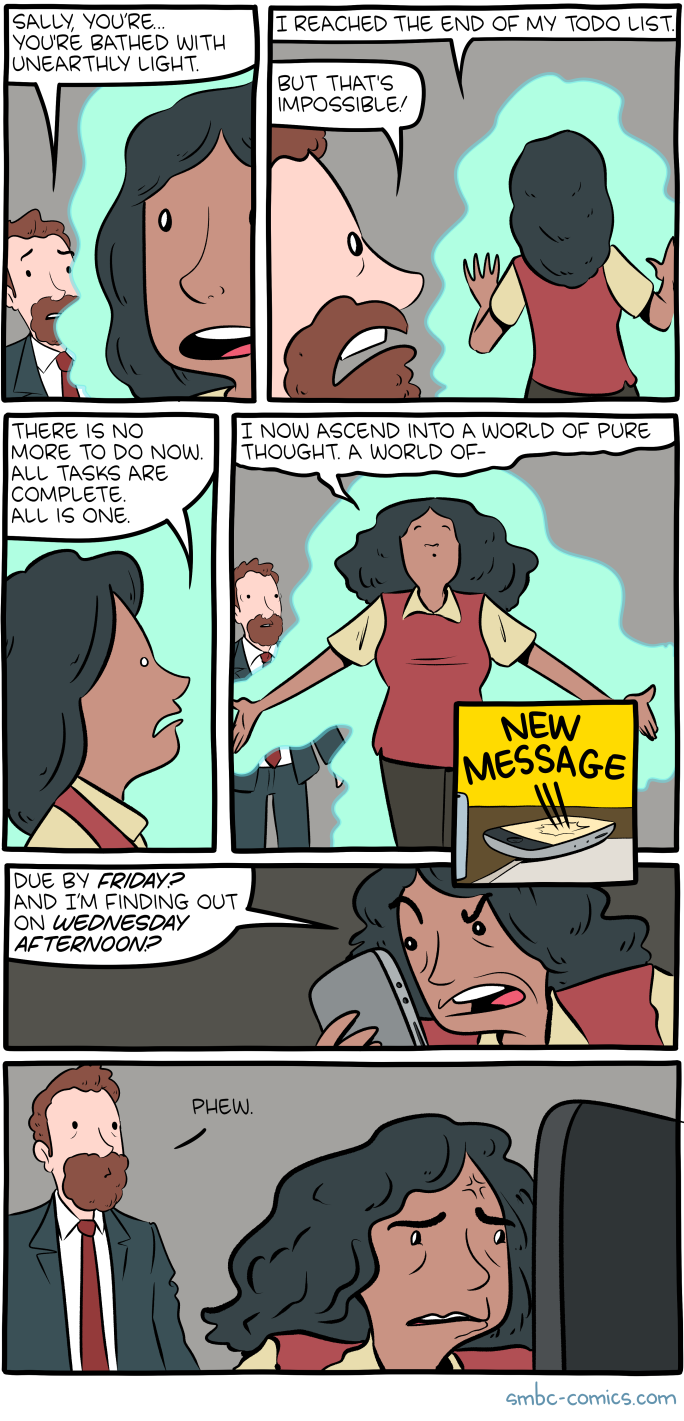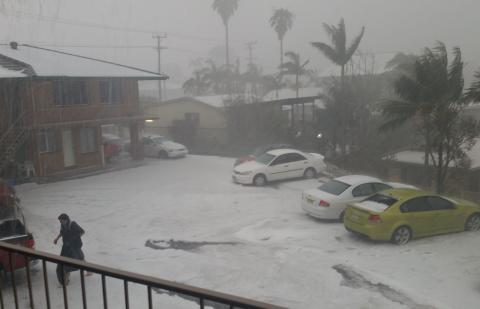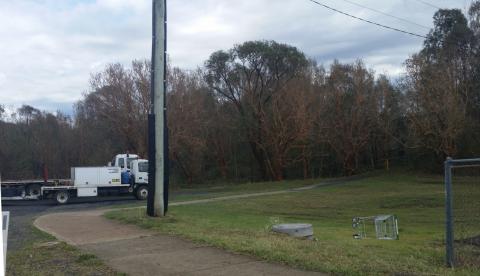A Quiet Day In
I'm back to work on Monday, after two months off recovering from surgery. I'd been overdoing it a bit on the exercise front, trying to make up for months spent flat on my back, so on my todo.txt under "Wed 20 Oct" I'd written "quiet day". It was cloudy, with a little bit of rain, so a perfect day for catching up on light chores and a bit of reading.
Then, as I was doing the washing up, this happened:
I couldn't record more than a few seconds of the storm at its' height, as it required some serious Marcel Marceau work to prevent being immediately blown back from the doorway.
I've never seen hail like it. Normally when a cold front hits moist air, you get a few minutes of hail before the storm loses it's sting and settles down into heavy rain. But on this occasion, the hail just kept coming. Before long, the Aloha carpark was at least four inches deep in it.
As usually happens in anything but the gentlest shower, the storm water drains immediately backed up, and runoff from the hills behind us started to etch a channel through the pack ice.
If you can overlook the shredded foliage and shattered lamps, the neighbourhood began to look positively festive.
As things began to settle down, my phone started pinging. The shopping centre where I work had been closed down until it could be cleaned up and structurally assesed.
Oh, great. I've been off recovering from surgery for eight weeks, and was due back Monday. My imminent return appears to have jinxed the building to the point where the roof caved in. It (the collapsed roof, not my return to work) made the national and international media.
The messages from work continue: Part-timers like myself may be needed to help clean up, or else at the store in town to deal with the overflow demand. Implied: casuals can go hang - no work for you.
(There's a few dozen on the payroll in my department: one or two are full time employees, the rest are part-time - with minimum contract hours that would not cover the cheapest rent available in the area, or casual - with no minimum hours. This arrangement guarantees a satisfyingly desperate servility from the labour force.)
As my friend Ruben observed, the universe is telling me I need a career change.
The next day I set out for a sticky beak around the neighbourhood. There's still plenty of ice wherever it's been sheltered from the sun and the wind. State Emergency Services are swarming about, clearing ice from roof gutters, throwing tarps over shattered skylights and solar water heaters, and demolishing collapsed awnings.
Nature has turned suddenly Autumnal, except that it's Spring, and none of these trees are deciduous.
Nothing like a walk on a carpet of shredded eucalyptus to really clear those sinuses.
The beloved workplace is indeed closed for the duration.
I went out of my way to bump into some of the less laddish of the lads from work. Incredibly, as best as I could make out from the hyper-masculine grunting, it appeared the plan was that we'd be up and running for home deliveries and click 'n' collect within days, and ready for in-store customers soon after.
I had assumed we'd be out of action for weeks, at the very least, while centre management fixed the roof. Silly me. Centre management have no intention of actually fixing the roof, because they have never fixed the roof. In the lightest of showers it is up to the individual stores to position buckets as needed. In extreme cases, where the sodden interior ceiling gives way such as in this staff lavatory earlier in the year, workarounds will be implemented like so:
Disaster preparedness for the twenty-first century: expect the unexpected, but expect the unexpected to occur long after you personally have moved on to another scam, so it will be somebody else's problem. This from the ideology that also brought you a global pandemic. Thanks, neoliberalism!
Meanwhile, there are plenty of opprtunities for freshening stale brands with a logotype makeover.
There's a pleasingly novel copper hue to the countryside.
And water views have never been more open, if unnervingly overlaid with a Brothers Grimm vibe.
Still a couple of months left in 2021. Can't wait to see what's coming next.
Sunday, 17 October 2021 - 12:01pm
This week, I have been mostly reading:
- Where Was All The Investigative Journalism On US Airstrikes The Last 20 Years? — Caitlin Johnstone:
The Pentagon doesn’t care that it snuffed out innocent lives in an airstrike; it does that all the time and its officials would do it a lot more if that’s what it took to secure their futures as lobbyists, consultants, board members and executives for defense industry corporations after they retire from the military. And the mass media don’t care either; they only cared about this one particular highly politicized airstrike during a withdrawal from a military engagement the mass media vehemently opposed. […] Think about all the murder victims we’d have known about if the news media had done its job and used their immense resources to investigate them as journalists should over the last twenty years. Think about how much harder it would have been for the war machine to inflict these evils upon the world if they had.
- A line in the water — Peter Mares, Inside Story:
With the world watching in horror as the window closes on evacuation efforts at Kabul airport, it’s hard to avoid the comparison with another drama, twenty years ago, involving Afghans fleeing a Taliban regime. The window to safety was blocked back then, too, but it was closer to home, on the waters around Christmas Island.
- Dinosaur Comics — by Ryan North:

- Kidnapping, assassination and a London shoot-out: Inside the CIA's secret war plans against WikiLeaks — Zach Dorfman, Sean D. Naylor and Michael Isikoff for Yahoo! News:
In 2017, as Julian Assange began his fifth year holed up in Ecuador’s embassy in London, the CIA plotted to kidnap the WikiLeaks founder, spurring heated debate among Trump administration officials over the legality and practicality of such an operation. Some senior officials inside the CIA and the Trump administration even discussed killing Assange, going so far as to request “sketches” or “options” for how to assassinate him. Discussions over kidnapping or killing Assange occurred “at the highest levels” of the Trump administration, said a former senior counterintelligence official. “There seemed to be no boundaries.”
- Jeff Bezos’s date with Boris Johnson didn’t prove all that taxing — David Mitchell in the Guardian:
The New York meeting with Bezos was extensively trailed in advance as an occasion when the prime minister would confront the world’s richest man on the issue of taxation. “Boris Johnson to address Amazon’s tax record with Jeff Bezos,” promised the Guardian; “Johnson’s taxing questions for Amazon,” warned the Times. Brace yourselves, Manhattan, the straight-talking Etonian is on his way! It didn’t quite work out like that. For a start, Jeff Bezos and his partner, Lauren Sánchez, were late. Was it gamesmanship or traffic? Traffic was blamed and there will have been traffic, but there’s always traffic. And the lateness played well in two ways: first Johnson was left waiting so seemed junior, and second Bezos showed himself vulnerable to traffic so seemed human. Despite his stratospheric wealth, he hadn’t arrived punctually, borne by chopper or drone or sewer crocodile. For the man whose stylist appears to have last worked with Donald Pleasence on You Only Live Twice, this was a refreshingly normal look.
The Saga of F-bomb Freddy, Part One
My neighbours, here at the Aloha Home for Deadbeat Divorcees, are a colourful lot. As a rule I've ried to keep out of their way for the last two years. I'm not actually rude, you understand. I smile and nod. I just don't talk, beyond the occasional "good morning", etc. That polite aloofness is how F-bomb Freddy came to suspect me as an obvious snitch.
As I generally don't talk to them, I rarely learn my nighbours' names. When I have to think about them, I use the names I've given them myself for internal reference. As tenancy here is overwhelmingly a matter of unfortunate circumstance rather than choice, a lot of people have come and gone: Boom Box Barry, Zen Ken, Breaking Bad, the Care Bear Kids, Surfing Steptoe, Thumper and Boyband, and so on.
The most memorable, by sheer dint of his desperate need to make an impression, was F-Bomb Freddy.
Freddy was one of those farking people who farking says farking farking all the farking time. His body language strongly suggested that he'd spent some time in prison; that or, less likely, an elite boys' school. Ever-mindful of social rank, he spent half his day swaggering and strutting about like a cockerel, and the other half slinking, glancing nervously over his shoulder as though fearing that he was about to be caught out for whatever past imprudent act was currently preying on his mind.
He occupied what had been the manager's lodgings back in the days when the Aloha was a motel, and had absorbed some of the proprietorial manner appropriate to the tenant of the largest unit in the facility. He always seemed to have a flatmate, but the cohabitation rarely lasted more than a few months before disintegrating into a fistfight in the carpark, followed by a shower of personal effects from the balcony. Yet somehow another flatmate arrived to take the last one's place before you knew it. Each had a shaved head, little in the way of teeth, and a baroque efflorescence of tattoos.
His only constant friend was Mayor McWheeze, who occupied the unit directly below mine. When Freddy wasn't patrolling/slinking about the perimeter in shorts and thongs, or skimming leaves from the common swimming pool to (in his mind, at least) earn his keep, he was holding forth to McWheeze.
Mayor McWheeze was a stupendously unhealthy man; one of those who prefer to approach the art of not dying at the highest degree of difficulty possible. He was almost perfectly spherical in shape, with a voice which started low down - somewhere about his navel - before rumbling up a congested windpipe, doubling back in frustration at a slack, toothless mouth plugged by an omnipresent smouldering cigarette butt, and at last gently seeping out of his nose like politely-suppressed flatulence.
In order to keep a firm footing on the wobbling tightrope which was all that separated near-death from actual death, McWheeze rarely left the table he'd set up at his front window. From behind flyscreen, he had a magisterial view of the only entrance to the complex, and took a keen interest in comings and goings, cheerfully saluting all in a manner which made one feel disconcertingly like Patrick McGoohan in the Prisoner.
In his own mind, Mayor McWheeze was the bright shining star at the centre of a seaside Bloomsbury set. In reality, his days were overwhemingly occupied in dispensing homilies to soothe the wounds from whatever slings and arrows F-bomb Freddy presently felt most outrageous. From upstairs I was mercifully spared the details, receiving only the gist via the to and fro of bitterly spat obscenities and mollifying emphysemic rumbles.
At the start of my tenancy, I wasn't much bothered by Freddy's alarmingly powerful stereo system. As a rule, Australians don't like to know more than a few dozen songs, any of which you can hear any time of the day in any suburban shopping mall. Conspicuous consumption often manifests as hi-fi equipment, so having one's bones rattled of an evening by the bass notes of the same songs over and over again must be accepted as merely the price of entry to suburbia.
However the verve with which Freddy enjoyed the Great Australian Songbook was somewhat disquieting. It had never occured to me that it was possible to whoop and yee-haw in exuberant joy along to the works of Billy Joel, Dire Straits, and the Eagles. Yet somehow Freddy managed to do so. With, it seemed with each passing week, increasing frequency and intensity.
I like to think of myself as a tolerant sort. I thought it not unreasonable to surmise that perhaps Freddy was nursing a broken heart and, having been spurned by some lady — or indeed gentleman, he was proving to himself that he had much left to live for, including slapping a thigh and hooting like a klaxon whenever Greatest Aussie Pub Rock Favourites Vol. 1 worked its' inevitable way around to Working Class Man.
Out of this desire to make allowances for a little high-decible self-care, and also a keen interest in finding a reason not to provoke someone who appeared considerably less reasonable, and more practiced in pugilism, than myself, I sought inside knowledge from Mayor McWheeze. One evening, as the keening strains of Sweet Child O' Mine etched visible ripples in the asphalt of the Aloha carpark, I stood by his window and asked, as casually as I could whilst shouting over the din, "What's the story with your mate over there?"
The hitherto relentlessly genial McWheeze turned dour, even going so far as to remove the cigarette butt from his mouth and stub it out. Possibly in an ashtray. It was impossible to tell through the flyscreen at dusk. "He likes a drink. Enjoys a bit of music," he pronounced at length, before lighting another cigarette to signal the end of the matter.
Ah. Jolly good. Just an obnoxious arse, then. "Is there anything you could do about it?"
He drew on his fresh cigarette for as long as his severly compromised lung capacity would permit, and gazed into the delicate tracery of burst capiliaries at the back of his drooping eyelids. "You could try writing a letter to the strata body."
"Right." Thanks for being so helpful. I will indeed correspond with a handful of people empowered to say "Stop it at once, or we shall be forced to ask you to stop it once more." I went back upstairs and shut all the windows.
Later that evening, Neil from the Young Ones, residing a few doors up the first floor landing from Freddy, had the temerity to slink over and knock on Freddy's door. He was tossed back like a leaf in a gale of full-throated farks. As Neil, on his heels and suddenly finding himself back at his own door, slipped inside, trembling, Freddy came out onto the balcony to address the gallery of twitching blinds.
"ANY OF YOUSE OTHER LOWLIFE FARKERS WANNA FARKING GO AT ME, YOUSE FARKING MAGGOTS?"
And thus mollified by the comparative silence of nothing but passing vehicular traffic and the lazy trotting of A Horse With No Name, Freddy returned to his lair.
After an hour or so, with no sign of the festival of easy-listening rock abating, Mayor McWheeze, motivated by some glimmer of community spirit, left his customary seat and waddled across the carpark.
He had no hope of ascending the stairs to the first floor landing, so he stood below, calling with increasing volume and urgency "Freddy… Freddy!"
I couldn't hear much of the resulting conversation over the J. Geils Band's 1982 smash Centrefold, but it was clear that Freddy transitioned from curiosity to shock, to outraged betrayal, and finally an explosion of fire and brimstone farks that had McWheeze skipping back to his flat as though peppered by buckshot.
At this final egregious violation of the sovereign Aussie male's right to feel the bassline of Peter Gabriel's Sledgehammer reverberating deep in his substantial loins, Freddy seemed fit to rend his garments, had they not been pretty thoroughly rent already. Instead he spun on his heels, and bellowed one final, desperate "FAAAAARK!" to nobody in particular before slamming his door behind him.
The next morning, Freddy was back on McWheeze's doorstep, the two exchanging politely convivial farks like characters in a Jane Austen novel.
There's something deeply disquieting about the aloof cameraderie between Australians who consider themselves mens' men. There's a sense of things understood but unspoken, seeming to hint at dark, soul-eating secrets; of tramatising initiation rites, pacts, threats, and decades-old unspeakable crimes. At least that's how it appears to me.
A few days later, I was sitting out on the landing with my laptop. Kitty, my darling fluffy grey feline familiar, had got it into her head that it was dinner time at two-thirty in the afternoon, so in the face of her implacable entreaties, I had no option but to put myself on the other side of the lounge room window in order to get some reading done.
Zen Ken, a petite, tanned, and alarmingly fit gentleman who eschewed shirts and footwear, and was in the habit of rising early to sit out on the back lawn cross-legged to greet the dawn, stopped by on his way downstairs for a spot of impromptu mindfulness among the stand of banana trees behind the pool. He asked me how I was settling in and what I thought of the place.
"It's fine, apart from…" I glanced in the direction of Freddy's flat, "the odd colourful character."
"Oh, I think he'll be pulling his head in from now on," he smiled, "After that letter to the strata body."
Oh, dear God no. I couldn't imagine anything more calculated to elicit Freddy's ire than a window-faced envelope and the use of the menacingly passive voice ("All residents are reminded that…"). Still, it was nothing to do with me.
"Your cat seems to want your attention," Ken observed, and went on his way, accompanied by the hum of finely-tuned chakras. No sense in wasting the best mind-emptying hours of the day in idle chit-chat.
I love a reasonable degree of uncertainty. I'm miserable out in the suburbs, because in the city you feel that at any moment anything might happen. Nothing ever does, but the potential is electrifying. However that's a different kind of uncertainty to the knowledge that you have an explosion coming, and you just don't know when it will arrive.
One morning, while getting ready for work I heard a knock on the door, shortly followed by the unmistakable "whomp" of a sheaf of paper hitting my doormat, and seconds later the beeping of a reversing delivery van, long gone by the time it took to walk the length of a very, very small flat.
The contents of this A4 window-faced envelope were at least a hundred pages thick and it was addressed to Freddy at unit 21. Mine is unit 20, where the line of rooms runs out, so it wasn't at all unusual for lost postmen (and once, a pair of police officers in armoured vests) to ask for the location of 21, over at the opposite end of the landing, next to unit 12.
I had so far managed to avoid any interaction with Freddy beyond nodding hello, but in the circumstances there was no alternative to being neighbourly. At least it clearly wasn't from the strata body. No consortium of landlords would take the time to devote over a hundred pages to anything.
The door was answered by a young man I'd never seen before. Did Freddy keep him in a cupboard?
"This is for here. Postman left it at my place."
"Oh, right. Thanks."
Crew cut, tattoos, crumbling teeth: Freddy definitely has a type. I never saw him again.
Freddy had just bought himself a new ute (the Australian term for a sedan-sized truck Americans would call a "pickup"). Gleaming white, like something out of the 1970s TV series Battlestar Gallactica. Lord knows how he could afford it; Freddy didn't seem to work.
I grew to love the absence of that vehicle. Freddy's unit being at the entrance to the complex, it was parked at the very front, and could be seen from a hundred metres away. When returning from work of an evening, my heart always sank to see it. I don't know why. In retrospect, it's clear that as he had no need, or particular desire, to go anywhere, it's absence could only mean that he was out purchasing a carton of cans of rum and cola, prior to filling a rotisserie of CD platters with the fruits of the bargain bin, cranking up the volume, and hitting the "shuffle" button.
Returning home one evening about a week after my little chat with Ken, I heard Freddy already in full swing before I saw his ute. I didn't know if Freddy was partial to any drugs other than rum and coke, but at the very least he was definitely one of those people who use alcohol to get wound up rather than to wind down. Quite apart from giving we mild, decent alcoholics a bad name, that class of drinker scares me.
I hurried up to my flat, keen to remain unobserved, though I'd hardly made it through the door before robust exchanges of opinion began echoing across the car park. By the time I'd served Kitty her dinner, the arguments that Freddy was simultaneously conducting with multiple interlocutors, like a chess grand master, had reached record-breaking intensity.
I drew the blinds. My neighbours all had curtains and/or venetian blinds, but my unit was kitted out with roller blinds. These were wonderfully low-maintenance, but had to be raised to at least half-mast if one wanted any fresh air or natural light. Positioned as I was at one end of the top row of units, with three big windows, it was rather like living in a giant illuminated fishbowl. When signing the lease, I reasoned that if somebody had any desire to watch me doing the washing up, or to stand out on the landing, nose pressed to the glass to enjoy the spectacle of an old wreck sweating and snoring though a humid summer night, that was very much their problem. This opinion had been under review for a while now.
The agitation outside was starting to sound as though an element of physical contact had worked its' way into proceedings. Concern for the welfare of my neighbours led me to open the front door and take a look.
Freddy was standing near the top of the stairs leading to his door, and I was relieved to see that it was unlikely he'd just pushed someone down them, as he was vigorously summing up his assessment of the character of Boombox Barry, for the latter's moral edification.
On noticing me framed in the light of my doorway, resplendant in business socks, boxer shorts, and burger-flippers' polo shirt, he swung round and thrust out an accusing finger.
"And YOU! If you've farkin' got something to say to me, whyn'tya come over here and farkin' say it to my face, ya cat-farker!"
The customary colour (a kind of mottled green-grey) drained from my haggard face. Oh, brilliant. He thinks it was me that made that farking — sorry, I mean that blasted — complaint to the strata body.
Freddy leaned over the railing, and dropping his vocal pitch for dramatic effect, announced in a low rasp, "I've got my farking eye on you, ya c**t!"
Unlike most of my neighbours, I lack any of the zest in my emotional repertoire that would enable me to respond with matching vigor, and so somewhat at a loss, I took a step back and closed the door. Freddy moved on to his next target without missing a beat.
Kitty had finished dinner, so now it was cuddle time. The fact that Freddy had chosen to make a point of Kitty's existence (and also, in passing, his unsettling explanation for why he thought anybody might want to keep a pet) unnerved me.
Being six foot two, and typically sporting pretty threadbare attire, I've had the luxury of living my adult life without much regard for my personal safety. I've strolled merrily late at night through some notorious precincts with blithe unconcern about being singled out as a target for assault and/or robbery, and am well aware of my privilege in that regard.
By drawing attention to Kitty, Freddy had struck at the heart of that complacency. After nearly fifty years on the planet, my major moral obligation was to that adorably vexatious ball of fluff. She was also my sole motivation: after a number of very difficult years, I was managing to keep it together for the sake of Kitty. And we were very happy in that condition. We were very nearly one person, except that no one person, at least in my experience, cares for themselves as Kitty and I cared for each other.
And that dim, foul-mouthed, petulant man-child was somehow cunning enough to identify her as my critical vulnerability. In doing so he had upset everything.
Continued in part two.
Sunday, 10 October 2021 - 3:31pm
This week, I have been mostly reading:
- Where Has All the Money Gone? — Robert Skidelsky in Project Syndicate:
But in his Treatise on Money, Keynes provided a more realistic account based on the “speculative demand for money.” During a sharp economic downturn, he argued, money is not necessarily hoarded, but flows from “industrial” to “financial” circulation. Money in industrial circulation supports the normal processes of producing output, but in financial circulation it is used for “the business of holding and exchanging existing titles to wealth, including stock exchange and money market transactions.” A depression is marked by a transfer of money from industrial to financial circulation – from investment to speculation. So, the reason why QE has had hardly any effect on the general price level may be that a large part of the new money has fueled asset speculation, thus creating financial bubbles, while prices and output as a whole remained stable. One implication of this is that QE generates its own boom-and-bust cycles.
- On The Cusp — George Monbiot:
If there’s one thing we know about climate breakdown, it’s that it will not be linear, smooth or gradual. Just as one continental plate might push beneath another in sudden fits and starts, causing periodic earthquakes and tsunamis, our atmospheric systems will absorb the stress for a while, then suddenly shift. Yet everywhere, the programmes designed to avert it are linear, smooth and gradual. Current plans to avoid catastrophe would work in a simple system like a washbasin, in which you can close the tap until the inflow is less than the outflow. But they’re less likely to work in complex systems, such as the atmosphere, oceans and biosphere. Complex systems seek equilibrium. When they are pushed too far out of one equilibrium state, they can flip suddenly into another. A common property of complex systems is that it’s much easier to push them past a tipping point than to push them back. Once a transition has happened, it cannot realistically be reversed.
- US government rights in patents on Molnupiravir, based upon funding of R&D at Emory University — Luis Gil Abinader at Knowledge Ecology International:
Molnupiravir, the oral pill that is showing promising results as a potential treatment for covid-19, was invented at Emory University with U.S. government funds. After more than six years of non-clinical testing, Emory licensed molnupiravir to Ridgeback Biotherapeutics to continue its development as a potential treatment for covid-19. The discovery and further research efforts made at Emory between 2013 and 2020 benefited from an estimate of $35 million dollars in government support. As a consequence of these investments, the U.S. government has rights in key molnupiravir patents. […] Perhaps one of the reasons why Ridgeback is minimizing the role of the U.S. government in the development of molnupiravir is to avoid demands to make the drug available at a reasonable price. That kind of move has worked for companies like Novartis in the past. Yet, as a promising oral pill with many potential generic suppliers, the availability and affordability of molnupiravir will likely face intense scrutiny in the upcoming months. Harvard and King’s College researchers Melissa Barber and Dzintars Gotham recently estimated the cost of production for molnupiravir. Based on a previously developed algorithm and public information they concluded that the cost of producing molnupiravir’s active pharmaceutical ingredients, including a 10% profit margin, is $19.99 a course. In June 2021, Merck announced an agreement to supply the U.S. government approximately 1.7 million courses of molnupiravir for approximately $1.2 billion. KEI has obtained a copy of this contract, which is discussed in another blog published today. According to the contract, the U.S. government will pay $712 dollars per unit of molnupiravir, about 35 times the cost of production as estimated by Barber and Gotham.
- GOP Lawmaker Pushes Insane Claim ‘Octopus-Like Creatures’ Are in Vax — Zoe Richards in the Daily Beast:
The email from the legislator contained a 52-page “report” with disinformation on COVID-19, including claims that “unknown, octopus-like creatures are being injected into millions of children worldwide.” The report also made claims that 5G technology had somehow been inserted into the vaccine to control people’s thoughts and called the pope and others “at the top” of the Roman Catholic Church “satanists” and “luciferans” for backing public health measures. The report additionally made the wild suggestion that the babies of vaccinated parents in Mexico were “transhuman”—born with “pitch-black eyes” and undergoing accelerated aging.
Boris: "We Took Back Britain. Now We're Taking Back India!"
In a surprise move, the UK government has announced plans to retake it's former colonial holdings on the Indian subcontinent, in a bid to bolster the country's post-Brexit global trade profile.
Prime Minister Boris Johnson addressed the media late yesterday from his "Westminster Shag Pad", saying "This deal, skillfully and unilaterally negotiated with our subjects, means that Britain immediately becomes not only self-sufficient in tea and sugar, but also the world's leading exporter of exotic spices, jute and fine muslin."
Shaking his pith-helmeted head at suggestions that that the return of the Raj to India might incur domestic job losses, Johnson claimed that "For those seeking work as colonial administrators, I am pleased to announce that at last the lean years are over. Indeed if anything this initiative will be a significant net job creator for boys who went to good schools."
Addressing former European partners, the Prime Minister provocatively asked "Do you see the wan and effete peoples of France, Holland, Portugal, or God help us the Belgians, hamstrung as they are by petty bureacracy, embracing the world beyond their doorstep - with gunboats if necessary?"
"This government is bold and forward-looking. This government is committed to building an empire fit for purpose in the twenty-first century. And this government will have access to a steady supply of opium beyond its' wildest dreams. Huzzah!"
Down the Tubes
Every now and then I find a video worthy of comment, and I never quite get around to commenting on it. Instead, I stick it in a directory labelled "blog".
Now I'm out of disk space on my desktop, my laptop, and for that matter my phone, so while I free up space here it comes, in installments. Back in the pre-pandemic days, I was watching:
How Dark Patterns Trick You Online
If somebody is required to show you something they don't want you to see, you'll find it in a locked filing cabinet in a disused lavatory with a sign on the door saying "Beware of the Leopard".
The Decentralized Web Is Coming — ReasonTV
Ten years ago I might have agreed with the title. Now I have no fight left in me, and I just have to say nope; it's hopeless.
I particularly like the way that they introduce Richard Stallman into the narrative with a photo of some guy with a beard who is definitely not Richard Stallman. I don't know who that person is, but apparently he must be the person who "helped create the popular open source operating system Linux", because that is not a description that RMS would apply to himself. Bonus lazy journalism points for illustrating the concept of "programmer" with the man page for grep.
Visiting a British Pub with Burgess (The Penguin) Meredith
"We're only trying to point out that some of these people are a little more… reserved than some of us."
From a World War II US Military Training film. Times have changed. These days they'd just take out the pub with a drone strike, and get offended at the lack of gratitude.
Endnote 4: How the Alt-Right is Like an Abusive Relationship
I can't help but be fascinated. I'd never slow down while passing the site of a car crash, but maybe I feel compelled because now we're all in the same car — the one that is crashing.
This Is Neoliberalism
This is a really nicely done series. Wish I'd done it.
2020 Harcourt Lecture - Professor Stephanie Kelton
If you've not heard about Modern Monetary Theory, you've not been to the pub with me at any point in the last seven years or so. If, under present circumstances, you aren't able to buy me a drink or six, the next best way to learn about MMT is from Stephanie Kelton. This lecture is from when she was a visiting professor at Adelaide Uni, immediately pre-pandemic, and just prior to the publication of the book which would make her the most influential economist in the world (among everybody but economists).
Season 26 Trailer | The Collection | Doctor Who
Just lovely. A damn near perfect series of Doctor Who, and the last for sixteen years.
Sunday, 3 October 2021 - 1:43pm
This week, I have been mostly reading:
- File not found: A generation that grew up with Google is forcing professors to rethink their lesson plans — Monica Chin in the Verge:
Catherine Garland, an astrophysicist, started seeing the problem in 2017. She was teaching an engineering course, and her students were using simulation software to model turbines for jet engines. She’d laid out the assignment clearly, but student after student was calling her over for help. They were all getting the same error message: The program couldn’t find their files. Garland thought it would be an easy fix. She asked each student where they’d saved their project. Could they be on the desktop? Perhaps in the shared drive? But over and over, she was met with confusion. “What are you talking about?” multiple students inquired. Not only did they not know where their files were saved — they didn’t understand the question. Gradually, Garland came to the same realization that many of her fellow educators have reached in the past four years: the concept of file folders and directories, essential to previous generations’ understanding of computers, is gibberish to many modern students.
- The 'fetal heartbeat' that defines Texas' new abortion laws doesn't exist, say doctors — Bethany Dawson, Business Insider:
Heartbeats in humans produce thump-thump sounds caused by the opening and closing of the heart's valves. However, in conversation with NPR, Dr. Nisha Verma, an OB-GYN who specializes in abortion care and works at the American College of Obstetricians and Gynecologists, says that that heartbeat doesn't exist in 6-week old fetuses. "At six weeks of gestation, those valves don't exist," she told the news site. In fact, it takes about 9-10 weeks for these valves to form.
- America dumbs down freedom, with disastrous consequences — Rob Schofield at NC Policy Watch:
There are obviously many factors at play in the pandemic of gun violence that plagues our nation, but at the heart of the matter is the simple fact that we are drowning in an ocean of poorly regulated, easy-to-access firearms. And this fact, in turn, is the undeniable byproduct of the modern gun lobby’s huge success in muddling and altering American understandings of “freedom,” so that a concept that traditionally connoted and implicated important ideas like responsibility and citizenship in addition to personal liberty, now for many means little more than “license” – the right to do pretty much whatever the hell one wants. A similar pattern is clearly at play in the COVID-19 pandemic. A half century ago, the idea of mass resistance to public health vaccinations was largely unthinkable and rightfully dismissed by most Americans as akin to the paranoid claims of the lunatic fringe in equating water fluoridation with totalitarianism. This acceptance did not arise because vaccination was risk-free. While most people were thankful for the personal health benefits they and their children would likely enjoy from vaccination, there was also a common understanding that vaccination was a public duty – a small sacrifice that one made as an act of citizenship in a free society. Today, after decades of well-funded, anti-government propaganda from the far right, a sizable chunk of the population rejects the citizenship component of freedom and our morgues and hospital ICU’s offer stark testimony to the impact of the shift.
- Saturday Morning Breakfast Cereal — by Zach Weinersmith:
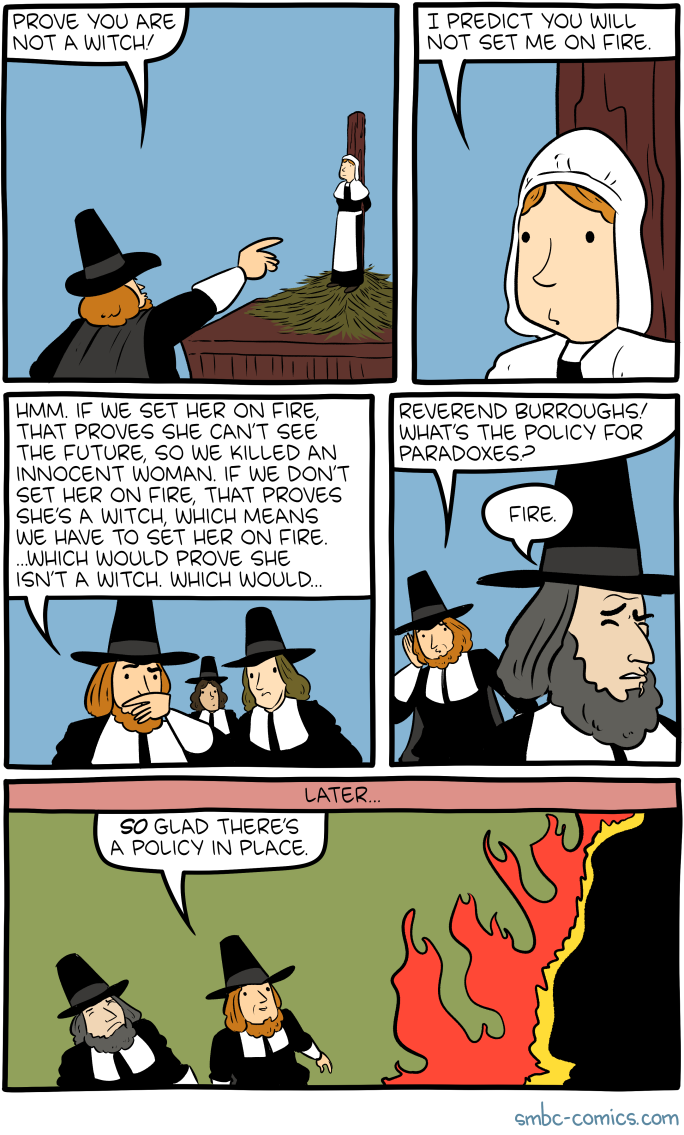
- Troll farms reached 140 million Americans a month on Facebook before 2020 election, internal report shows — Karen Hao in MIT Technology Review:
In the run-up to the 2020 election, the most highly contested in US history, Facebook’s most popular pages for Christian and Black American content were being run by Eastern European troll farms. These pages were part of a larger network that collectively reached nearly half of all Americans, according to an internal company report, and achieved that reach not through user choice but primarily as a result of Facebook’s own platform design and engagement-hungry algorithm. […] “Instead of users choosing to receive content from these actors, it is our platform that is choosing to give [these troll farms] an enormous reach,” wrote the report’s author, Jeff Allen, a former senior-level data scientist at Facebook.
- Bad News: Selling the story of disinformation — Joseph Bernstein in Harpers:
The content giants—Facebook, Twitter, Google—have tried for years to leverage the credibility and expertise of certain forms of journalism through fact-checking and media-literacy initiatives. In this context, the disinformation project is simply an unofficial partnership between Big Tech, corporate media, elite universities, and cash-rich foundations. Indeed, over the past few years, some journalists have started to grouse that their jobs now consist of fact-checking the very same social platforms that are vaporizing their industry. Ironically, to the extent that this work creates undue alarm about disinformation, it supports Facebook’s sales pitch. What could be more appealing to an advertiser, after all, than a machine that can persuade anyone of anything? This understanding benefits Facebook, which spreads more bad information, which creates more alarm. Legacy outlets with usefully prestigious brands are taken on board as trusted partners, to determine when the levels of contamination in the information ecosystem (from which they have magically detached themselves) get too high. For the old media institutions, it’s a bid for relevance, a form of self-preservation. For the tech platforms, it’s a superficial strategy to avoid deeper questions. A trusted disinformation field is, in this sense, a very useful thing for Mark Zuckerberg.
Sunday, 26 September 2021 - 10:57am
This week, I have been mostly reading:
- The experts weigh in — This Modern World by Tom Tomorrow:

- National Self-Sufficiency — John Maynard Keynes:
The nineteenth century carried to extravagant lengths the criterion of what one can call for short "the financial results," as a test of the advisability of any course of action sponsored by private or by collective action. The whole conduct of life was made into a sort of parody of an accountant's nightmare. Instead of using their vastly increased material and technical resources to build a wonder city, the men of the nineteenth century built slums; and they thought it right and advisable to build slums because slums, on the test of private enterprise, "paid," whereas the wonder city would, they thought, have been an act of foolish extravagance, which would, in the imbecile idiom of the financial fashion, have "mortgaged the future"--though how the construction to-day of great and glorious works can impoverish the future, no man can see until his mind is beset by false analogies from an irrelevant accountancy. Even to-day I spend my time--half vainly, but also, I must admit, half successfully--in trying to persuade my countrymen that the nation as a whole will assuredly be richer if unemployed men and machines are used to build much needed houses than if they are supported in idleness. For the minds of this generation are still so beclouded by bogus calculations that they distrust conclusions which should be obvious, out of a reliance on a system of financial accounting which casts doubt on whether such an operation will "pay." We have to remain poor because it does not "pay" to be rich. We have to live in hovels, not because we cannot build palaces but because we cannot "afford" them.
- The Great American Science Heist: How the Bayh-Dole Act Wrested Public Science From the People’s Hands — Alexander Zaitchik, the Intercept:
Speaking before the subcommittee, Rickover railed against the proposed policy changes. “Government contractors should not be given title to inventions developed at government expense,” he said. “These inventions are paid for by the public and therefore should be available for any citizen to use or not as he sees fit.” This seemed self-evident to Rickover. After all, he noted, “companies generally claim title to the inventions of their employees on the basis that the company pays their wages.” It befuddled and angered him that the U.S. government would consider giving up its own shop rights to industries that would never do the same. In his decades managing the development of nuclear reactors, Rickover had witnessed the very contest between public interest and private greed so clearly anticipated by mid-century advocates for keeping public science under public control. In the final months of the Carter administration, this position, advocated most forcefully during the wartime birth of today’s federal research establishment, was fading as a Democratic faith.
Sunday, 19 September 2021 - 2:08pm
This week, I have been mostly reading:
- The Paradox of Trumpist Patriotism — Joshua Tait in the Bulwark:
Trumpist writers have worked themselves into such a state that they have stretched their critique to include literally half of the American population. As Michael Anton, a former Trump aide who is now a Claremont Institute senior fellow and a Hillsdale lecturer, puts it, “one side loves America, the other hates it—or can tolerate it only for what it might someday become, were the Left’s entire program to be enacted without exception.” Anton, the articulate id of intellectual Trumpism, cuts America in two on religious, linguistic, and even moral grounds, casting the Biden coalition as speaking a babble of languages, worshipping “wokeness” with “Dionysian abandon,” and conceiving of justice solely through the lens of punishment. In a blunt essay, Glenn Ellmers, another Claremont and Hillsdale associate, claims “most people living in the United States today—certainly more than half—are not Americans in any meaningful sense of the term.” In part, Ellmers means that “foreigners who have bypassed the regular process for entering our country, and probably will never assimilate to our language and culture, are—politically as well as legally—aliens.” But Ellmers’s real target is native-born Americans “who may technically be citizens of the United States but are no longer (if they ever were) Americans.” These pretenders “do not believe in, live by, or even like the principles, traditions, and ideals that until recently defined America as a nation and as a people.” Who are the real Americans then? The 74 million who voted for Trump in 2020.
- We’re all teenagers now — Paul Howe in Aeon:
The real world is also replete with examples of adults acting like adolescents in many aspects of their lives. The phrase ‘unintended consequences’ used at the beginning of this essay usually implies negative effects, but there are notable benefits as well. As a result of the gradual absorption of adolescent qualities, we’ve slowly chipped away at many rigidities of the adult world and grown more free-spirited, open and spontaneous […] These youthful character traits have served to make us more accepting and generous in many respects. Rising tolerance towards marginalised groups can be partly attributed to this emergent youthful mindset – a process normally seen as originating with the dynamic social movements of the 1960s and ’70s, but which actually can be detected much earlier in the shifting attitudes of rising generations from the early 20th century onwards. Traits connected to openness have also made us more creative compared with a century ago – contributing to the long-term rise of what the urban theorist Richard Florida has called the ‘creative class’, people who value creativity and individuality in the workplace and other areas of their lives, and thereby contribute greatly to economic innovation and prosperity. The impact of adolescence on the adult world has played a major, and underappreciated, role in generating these vitally important liberating effects that have transformed life for the better over the long haul. But there is an undeniable downside to the story as well. Many authors have traced the pernicious rise of impulsiveness, incivility and me-first brashness across different sectors of US life – social and cultural, economic and political.
- Why it breaks your brain to take a compliment — The Oatmeal:

- The Most Precious Resource is Agency — Simon Sarris:
Who could blame young adults for thinking that work is fake and meaningless if we prescribe fake and meaningless work for the first two decades of their existence? By confining meaningful work to an adult-only activity, it is little wonder that adolescence is a period of great depression. It would be surprising if it was not. Even for smart children, education endlessly ushers them towards an often far and always abstract future, so far and abstract that some children seem to apprise the opposite of agency, they take on a learned helplessness, and downplay that the future is a reality at all.
Sunday, 12 September 2021 - 7:46am
This fortnight, I have been recovering from surgery, tearing through my RSS backlog, and mostly reading:
- Thought for the day — Digby's Hullabaloo:

- Coming in 2040: No Future, the First Punk Rock Nursing Home — Lisa Borders at McSweeney's:
Do the seniors in your life sneer at the idea of decorum? Spit at the mention of Rupert Murdoch, and go into an anti-Reagan rant like it’s 1984 and they’re canvassing for Mondale? Do they insist that none of the good music in the ’80s was played on the radio, except for college radio? Have you found old photos of Grandma when she was 20 wearing Doc Martens, ripped fishnet stockings, and a miniskirt? If you answered “yes” to any of the above, then No Future might be just the place for your elders to rock out their sunset years. Staffed almost entirely by the love children of Henry Rollins, we’re opening our doors in 2040 at this first-of-its-kind facility. From the moment you walk in, you’ll see the difference. Gone are the floral wallpaper borders, the fake oak wainscoting, the lingering scent of Febreze and death you’ll notice in other elder care facilities. We’ve designed No Future to resemble a warehouse squat, the kind in which your loved one likely attended many a gig. Our thin Berber carpeting was custom-ripped, cigarette-burned, and beer-soaked for maximum authenticity.
- Hayek’s Bastards: The Populist Right’s Neoliberal Roots — Quinn Slobodian in Tribune:
Both neoliberals and the new right scorn egalitarianism, global economic equality, and solidarity beyond the nation. Both see capitalism as inevitable and judge citizens by the standards of productivity and efficiency. Perhaps most strikingly, both draw from the same pantheon of heroes. A case in point is Hayek himself, who is an icon on both sides of the neoliberal-populist divide. Speaking alongside Marine Le Pen at the party congress of the French National Front in 2018, self-described populist Steve Bannon condemned the ‘establishment’ and the ‘globalists’ yet built his speech around Hayek’s own metaphor of the road to serfdom, invoking the authority of the master’s name
- Good Morning, I.. WHOA! Uuh, I'll Come Back - Grant Hojohn — Phil Are Go!:
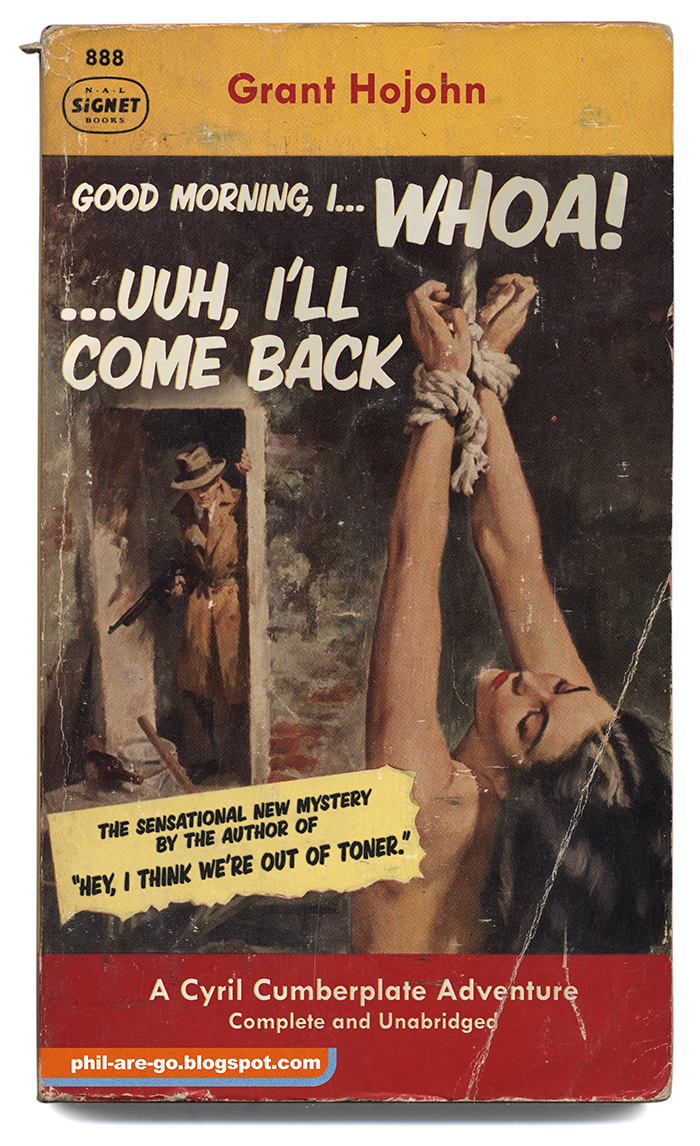
- The Roots of White Evangelicalism’s Crisis Are in White Evangelical Churches, Not Republican Politics — Jesse Curtis in Religion Dispatches:
Within a decade of Jim Crow’s demise, the hottest trend in white evangelical church startups taught that racial diversity in local churches threatened church growth. An influential cadre of white evangelical professors and mission theorists centered at Fuller Seminary assured a new generation of pastors that homogeneous congregations allowed worshippers to feel at home with “Our Kind of People” —i.e. white people—and facilitated healthy church growth. Race was a matter of pragmatism rather than justice; merely a tool that could be used to expand the evangelical coalition. They insisted this had nothing to do with the bad old days of segregation. They were merely finding the most effective ways to spread the gospel. Black evangelical pastors such as Clarence Hilliard warned that a theology of church growth that focused on homogeneous congregations and a personal ticket to heaven was quietly forming deep habits of selfishness in a racist society. It was 1976, and Hilliard wasn’t critiquing the Christian Right, because it didn’t exist. He was warning about what white evangelicals were learning in their own churches.
- Robodebt: A multi-layered policy failure — Peter Whiteford in Progress in Political Economy (PPE):
The Robodebt fiasco involves policy failures across numerous dimensions. The most obvious – and in many ways the least important failure – is that it failed to achieve the budgetary savings that were its main objective. A more important failure is that the Australian government decided to act unlawfully. This was compounded by the failure of the administrative procedures of government to identify and prevent these unlawful acts. Even more seriously, hundreds of thousands of people were adversely affected. This human cost is difficult to assess and involves much more than financial losses. Just over 2,000 people who had received a Robodebt notice between July 2016 and October 2018 died during that period, although in the absence of an official coroner’s report, no causes can be attributed. However, it has been noted that from January 2017, Centrelink began tweeting the contact number for Lifeline, the national charity providing 24-hour support and suicide prevention services.
- This Modern World — by Tom Tomorrow:
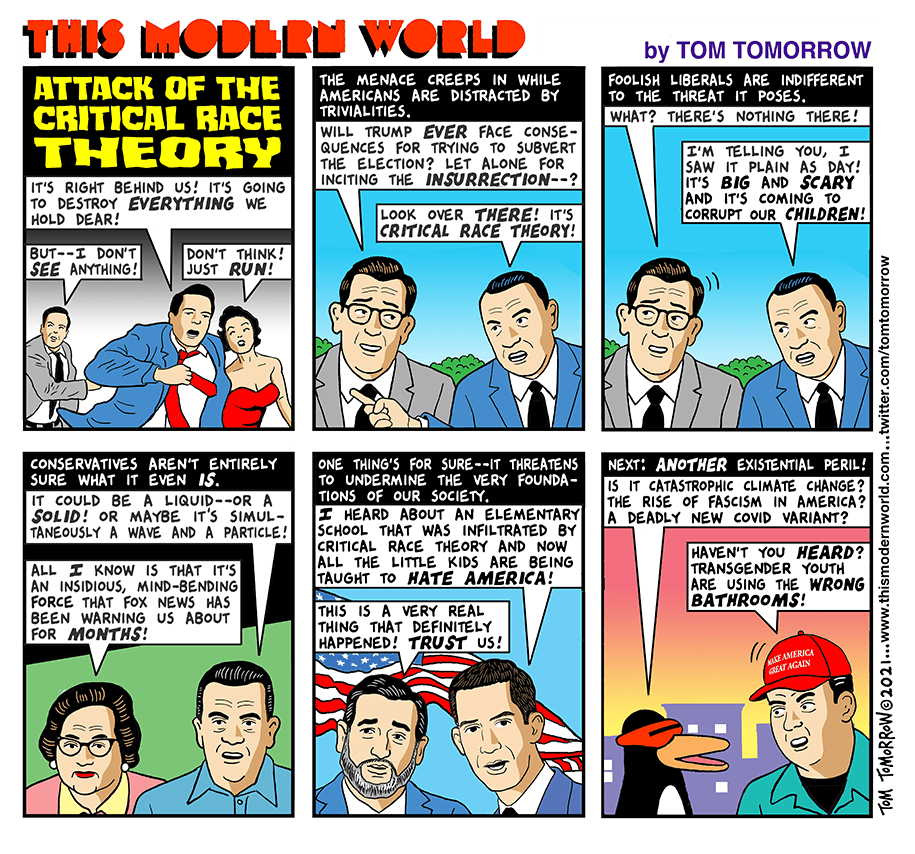
- U.S. Military Training Document Says Socialists Represent “Terrorist” Ideology — Ken Klippenstein in the Intercept:
A Navy counterterrorism training document obtained exclusively by The Intercept appears to conflate socialists with terrorists and lists the left-wing ideology alongside “neo-nazis.” A section of the training document subtitled “Study Questions” includes the following: “Anarchists, socialists and neo-nazis represent which terrorist ideological category?” The correct answer is “political terrorists,” a military source briefed on the training told me. The document, titled “Introduction to Terrorism/Terrorist Operations,” is part of a longer training manual recently disseminated by the Naval Education Training and Command’s Navy Tactical Training Center in conjunction with the Center for Security Forces. The training is designed for masters-at-arms, the Navy’s internal police, the military source said.
- Essentialism and Traditionalism in Academic Research — Ryan Kyger and Blair Fix:
‘Essentialism’ is the view that behind real-world objects lie ‘essences’ — a type of eternal category that you cannot observe directly but is nonetheless there. Racial categories are a common type of ‘essence’. To be racist is to attribute to different groups universal qualities that define them as people. Given the long history of racism, it’s clear that humans need little impetus to impose categories onto the world. Still, our instinct to categorize is not always bad. In fact, it’s a key part of science. Looking for patterns is how Dmitri Mendeleev created the periodic table. It’s how John Snow discovered that cholera was water-borne. And it’s how Johannes Kepler discovered the laws of planetary motion. So if categorizing patterns can be helpful, what makes essentialism bad? To be essentialist, in our view, is to reify a category (or theory) into a ‘higher truth’. By so doing, you don’t use evidence to inform a theory. You use theory to interpret evidence … and you don’t consider that you could be wrong.
- Health Drink — xkcd:
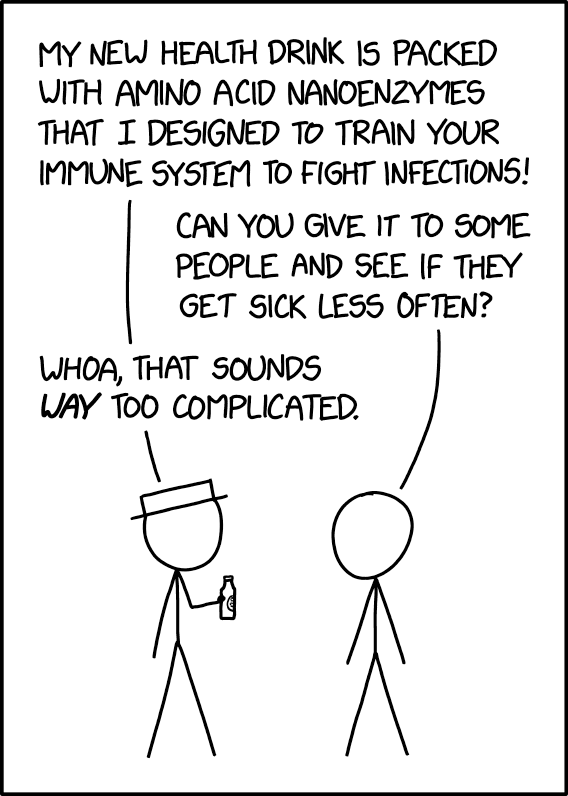
- The Horrifying Rise Of Total Mass Media Blackouts On Inconvenient News Stories — Caitlin Johnstone:
Two different media watchdog outlets, Media Lens and Fairness & Accuracy In Reporting (FAIR), have published articles on the complete blackout in mainstream news institutions on the revelation by Icelandic newspaper Stundin that a US superseding indictment in the case against Julian Assange was based on false testimony from diagnosed sociopath and convicted child molester Sigurdur Thordarson. […] “We have not found a single report by any ‘serious’ UK broadcaster or newspaper,” says the report by Media Lens. “But in a sane world, Stundin’s revelations about a key Assange witness — that Thordarson lied in exchange for immunity from prosecution — would have been headline news everywhere, with extensive media coverage on BBC News at Six and Ten, ITV News, Channel 4 News, front-page stories in the Times, Telegraph, the Guardian and more.”
- Saturday Morning Breakfast Cereal — by Zach Weinersmith:
